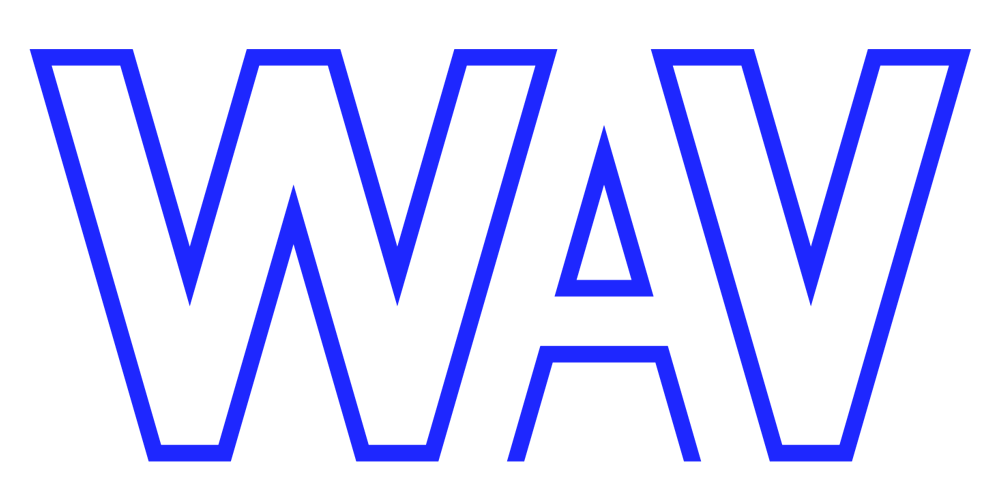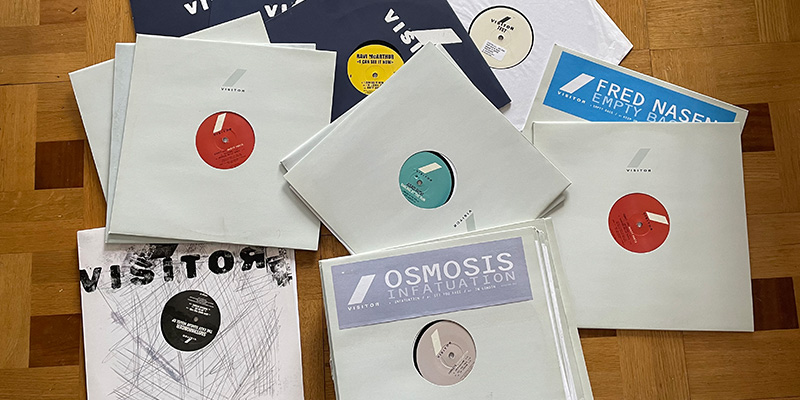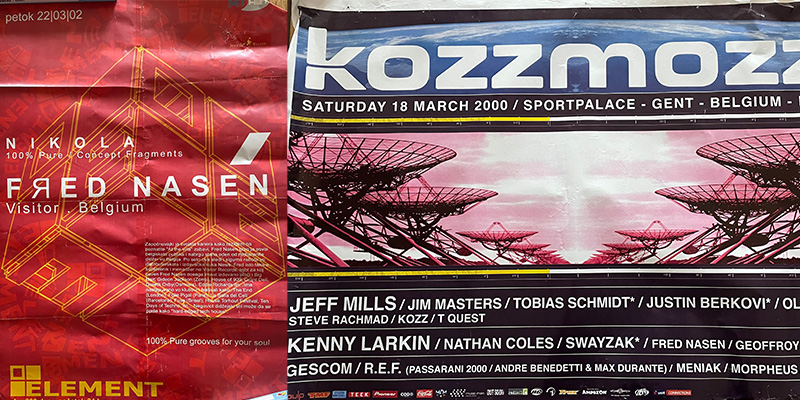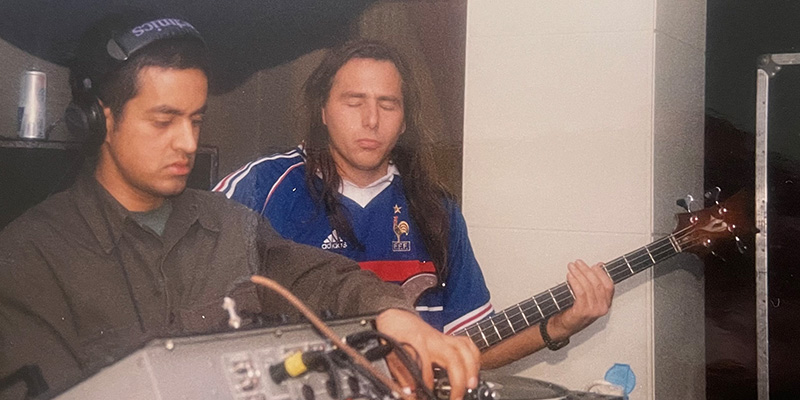Words by Jonas Lion
Cover photo: Fred Nasen & Big Hair (Sarajevo 2002)
Tech house is back – and so is Visitor Records, Belgium’s biggest tech house record label. Almost 18 years after the last release, label owner Fred Nasen and N.E.W.S. Records are making the entire catalogue available digitally for the first time via Bandcamp , Beatport , Apple Music, Spotify & YouTube.
After trance and UK hardcore, there’s another ‘forgotten’ genre that’s making a comeback in the DJ-booths of Europe’s hottest nightclubs. Tech house didn’t always enjoy the best reputation, but a new generation of artists is discovering what made the early pioneers fall in love with the genre in the early 2000s. In Belgium, Fred Nasen was the undisputable main man of tech house, operating one of the genre’s most renowned record label, Visitor Records, which released over 40 records between 2000 and 2006 – some with the biggest names in the game. “I’ve always had this special attraction to tech house because it had two things I love in music: a melodic bassline and a trance vibe”, he says.
With scene instigators like Eddie Richards, Terry Francis, David Mothersole, Nathan Coles, Mr. C and Bushwacka!, tech house was mostly a London affair that centered around the Swag Record Shop in Croydon. Much to Fred’s frustration, the genre did never catch on across the channel. There has never been a real tech house community in Belgium. Our country had its fair share of house and techno parties, but tech house remained a fairly niche sound. The only way to educate yourself on what was going on in London was through magazines and mix CDs. “I was lucky to work as import manager for the record label N.E.W.S. Records at the time, so I got in touch with a lot of tech house records through other distributors like Intergroove UK or Shady Acorns.”
A Belgian chapter in a British story
As any sensible DJ would do, Fred put his professional contact to good use and started playing unknown tech house records in clubs like Ghent’s Decadance, one of the only places in Belgium to catch the train early. Promoter Sandra Dierick joined forces with Fred and set up what could be considered the first tech house night in the country. “She was one of the earliest dedicated fans and she was the first to book artists like Mr. C and Bushwacka! over here.”
After he got his club night residency at Kozzmozz, Fred grew more confident in the idea that a tech house records label would do well in Belgium. “After all, there were no local imprints throughout the whole Benelux – and I was working at one of the largest independent record distribution companies in Europe, so I was in a good position”, he adds. “That’s how Visitor Records came to be.”
In 2000, the inaugural record was released by Fred himself. It turned out to be his ticket to the tech house inner circle. “Once the Swag Records guys stocked my first release, a lot of producers wanted to get involved. Gideon Jackson, Grant Dell, Nathan Coles and Affie Yusuf all did remixes and original releases in the beginning.” Tech house godfather Eddie Richards remembers those moments fondly too. “Visitor Records had good distribution and a regular release schedule, so it helped those artists gain more recognition.”
Fortunate as he was, the Visitor Records owner had to scout talent abroad. “I was doing some gigs around Europe, from Paris to Sarajevo, but somehow the spark didn’t catch fire over here. I still feel bad we never had a release with a Belgian producer other than me, but that wasn’t for a lack of trying”, Fred says. “I never had the feeling tech house broke through. It was only years later, when Visitor Records had already stopped operations, that people told me how much of a fan they were. Comments like these always caught me by surprise.”
Minimal house crashed the vibe
All that said, tech house did eventually get a bad rep. It was often accused of using the same formula and came to find it less interesting. Even Fred has to admit originality became increasingly difficult to find in the genre. “When the first Reverberations EPs came out, it was nothing short of life changing”, he explains. “But with more new labels on the market using the same formula, you started to know what to expect. Somehow it lost a bit of its magic.”
There are many reasons why tech house eventually fell out of grace within the larger electronic music scene. “Maybe it had something to do with the fact that the genre didn’t really have any major artists that transcended their own niche.” But perhaps most of all, the genre was (in)voluntarily coopted by other movements, who used the bits of tech house they liked, before moving on to the next fad. “Electro house and minimal house music around 2004, like the Get Physical releases, drew inspiration from tech house, but they certainly were different sounds. Suddenly, everything was labeled ‘tech house’. Now that the genre had finally reached the masses, the instigators lost interest. Like many others, Nasen fell out of love with tech house, and eventually Visitor Records sales dwindled.
Old music and new beginnings
Even though there has always been a core fanbase that remained active in the decades that followed, it’s hard to deny that tech house has enjoyed an interesting resurgence as of late. Contemporary artists and DJs like Moxie (cf. NTS Radio) uses their platforms to showcase some of tech house’s old gold. As is the case with many underappreciated genres that find a second life through scene influencers – trance, in particular, comes to mind – it had suddenly become cool to play tech house again.
Eddie Richards is unbothered by the ups and downs of the genre’s status. “It seems to go in and out of fashion all the time, but I just stick to what I like: a sound somewhere in between house and techno”, he says. That is, quite literally, the core of tech house, untainted by modern interpretations.
Unlike the first time around, this time, Belgian DJs were much more interested in the forgotten tech house records. “Lola Haro, and later Bibi Seck, were the first ones to get in touch with me because they liked the Visitor Records catalogue, which I did not see coming”, Fred explains. “That’s when I realized I needed to do something with our huge collection.” After all, none of the Visitor Records releases was ever released digitally – and many of the physical records had become a rare find. The Lilac Road Productions single, for example, is being resold on Discogs for €40 and more.




